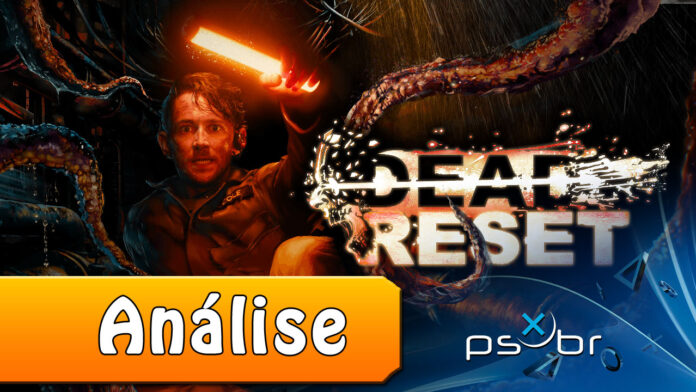Before diving headfirst into the Dead Reset analysis, Wales Interactive’s newest FMV (or full motion video) live action production, I’ll make a confession: I adore great stories with respectable production value that are expertly executed both technically and in audiovisual narrative essence; and I enjoy the complete opposite even more—a sort of guilty pleasure in questionable works, which automatically draws me to what I knew awaited me here.
After the futuristic sci-fi experience developed in The Complex and the foray into eighties-style action with Mia and the Dragon Princess, Dead Reset finds its core theme in creature horror, while retaining a certain futuristic mythology that ultimately makes this the most video game-like production among those mentioned.
With no memory of how he got there, surgeon Cole Mason wakes up in a research facility and finds himself “invited” (at gunpoint) to perform emergency surgery for a highly unconventional reason which, unsurprisingly, doesn’t go as his captors planned.
We’re introduced to a group of unfriendly characters who clearly can’t handle unexpected results in an experiment that essentially tries to break space-time concepts. This is where we start making choices that will determine our hero’s fate, as well as that of his unwilling companions.
It doesn’t take long for us—like Cole—to discover that wrong decisions trigger devastating deaths, only to wake up in a time loop we alone remember. Here, the game’s concept reveals itself as a mashup of classic films like the unforgettable Groundhog Day, the hit Edge of Tomorrow, and less celebrated works like the solid Happy Death Day and the Until Dawn video game adaptation.
The restart-after-gruesome-death device isn’t new or original, feeding off the “second chance” principle essential to video games. Ironically, this is Dead Reset’s greatest weakness, as the meaningful decisions here lack tension regarding the protagonist’s safety—should he fail, he restarts from a safe point.
In other words, if a wrong choice leads to a horrific death, we return to the last checkpoint to reassess options, artificially diminishing the supposedly imminent danger. The truly significant branching paths determine survival (or not) for other members of Cole’s involuntary group. Alliances and conflicts with them drive the different possible endings.
While deciding who lives or dies among companions should carry dramatic weight, relationship-building suffers from a bigger problem than narrative clichés or the subpar acting of a non-star cast: every character is detestable to varying degrees, resulting in minimal empathy for any of them.
Unsurprisingly, whenever given the option to sacrifice someone, shoot them, or leave them to their fate, I hesitated not at all. From the research mastermind to the security chief; from the supposed romantic interest to the team’s buffoonish psychologist—I wanted to abandon them, preferably helping guide them toward painful, cruel ends.
The exception, oddly and almost comically, is the creature haunting the facility. Its design is blatantly Alien-inspired (another cinema classic currently spotlighted by the Alien Earth series). However, due to obvious budget differences, Dead Reset aimed for the xenomorph but landed closer to a clumsier version of Mal from Castelo Rá-Tim-Bum.
Embracing the “so bad it’s good” rule, the game cultivates a low-budget charm through practical effects—a rubber-suited creature and copious fake blood smeared on walls. Horror and suspense give way to near-farcical adventure, a satirical self-parody where nothing seems meant for serious scrutiny.
Determining the intentionality behind this self-parody remains difficult. Yet herein lies the game’s greatest strength. Within half an hour, I intentionally chose the goofiest options—not expecting better outcomes but to witness absurd scenarios unfold. At worst, Cole would die and revert to an earlier point—no real stakes. Early endings like Black Mirror: Bandersnatch’s were impossible.
The diegetic mechanic enabling this is simple but effective: each segment restarts upon hearing a mysterious alarm, establishing the checkpoint reset. This event grants our protagonist visions of possible near futures—a power tied to why he’s there. Dying after this point returns us here, not to the story’s beginning.
Meanwhile, deaths occurring before crossing into each loop become permanent. So if your maintenance chief gets mauled and you reach the next cycle, she’s gone. If you die first, she reappears post-reset. Sounds confusing but acts as a simple solution for injecting decision impact.
To avoid claiming every character is purely stereotype fodder, there is a relationship system similar to Supermassive Games’ titles. Contextual choices shift bonds via a relationship meter, which ultimately matters little beyond feeling like saving/dooming acquaintances.
Gameplay-wise, it’s consistently binary choices, usually timed. This pressure eases by activating the “streamer” mode in options—removing countdowns and letting players ponder indefinitely.
Despite its limitations (intentional or not), as I said upfront, I’m drawn to such brazenly cheap, intentionally campy productions—something I’ve defended before. Dead Reset tested my limits and delivered gleefully trashy fun by shamelessly doubling down on absurdity.
The performances lean into hilariously one-dimensional archetypes; environments thrive on improvised sets exuding student-film charm. Limitations even shine through in unconvincing deaths and gore effects, forcing creative editing solutions.
The result is undeniably cheap yet endearingly distinct—a personality lacking in many pricier yet soullessly sanitized productions. Despite resembling a low-budget college film, its grimy art direction and grainy cinematography reveal texture, evoking technical limits outweighed by passion.
That said, this won’t please everyone. From severely limited interactivity (sparse player inputs) to the shallow, uncreative script (despite horror/temporal twists), it isn’t compelling, immersive, or impactful. It’s niche, leveraging its flaws without transcending them.
Accordingly, Dead Reset will likely delight existing fans of the studio. Its consistency in interactive language and storytelling establishes an increasingly distinct style that separates it from other developers. But for critics of prior works? This won’t change minds.
Dead Reset is available for PS4, PS5, Xbox One, Xbox Series, Switch, and PC with Brazilian Portuguese subtitles. This review covers the PS5 version and was conducted using a code provided by Wales Interactive.




